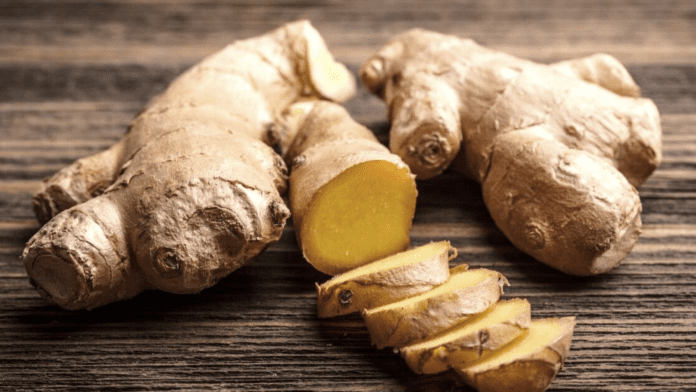Endometriosis is a challenging and often painful condition that affects millions of women worldwide. Characterized by the abnormal growth of endometrial tissue outside the uterus, this chronic disorder can lead to severe pain, infertility, and reduced quality of life. While conventional treatments like hormone therapy and surgery exist, many women seek alternative remedies to complement their management of endometriosis symptoms. One such natural option that has gained attention is ginger. This article aims to explore the potential benefits of ginger in managing endometriosis symptoms and how it may provide relief to women struggling with this condition.
Understanding Endometriosis:
Before delving into the role of ginger in managing endometriosis, it’s essential to grasp the key aspects of the condition. Endometriosis occurs when the endometrium, the tissue that lines the uterus, grows outside the uterine cavity, typically in the pelvic region. During the menstrual cycle, these endometrial tissues undergo similar changes as those inside the uterus, leading to inflammation, scarring, and the formation of painful lesions.
The symptoms of endometriosis can vary in intensity, ranging from mild discomfort to excruciating pain. Common symptoms include pelvic pain, heavy or irregular menstrual bleeding, pain during sexual intercourse, and infertility. The condition’s exact cause remains unclear, but hormonal imbalances, genetic factors, and immune system issues are believed to play a role in its development.
Conventional Treatment and Its Limitations:
Current medical treatments for endometriosis aim to manage symptoms, reduce pain, and improve fertility. Hormone therapy, such as birth control pills, is often prescribed to regulate the menstrual cycle and reduce the growth of endometrial tissue. For severe cases, surgery may be recommended to remove endometrial lesions and scar tissue. While these approaches can be effective, they also have limitations and potential side effects, prompting many women to explore alternative remedies like ginger.
The Potential of Ginger in Endometriosis Management:
Ginger (Zingiber officinale) is a medicinal herb widely recognized for its anti-inflammatory, analgesic, and antioxidant properties. It has a long history of traditional use for various health conditions, including menstrual pain and discomfort. Several components in ginger, such as gingerols and shogaols, are believed to contribute to its therapeutic effects.
1. Anti-Inflammatory Properties:
Endometriosis is associated with chronic inflammation caused by the presence of ectopic endometrial tissue. Ginger’s potent anti-inflammatory properties may help alleviate this inflammation, reducing pain and discomfort associated with the condition. Studies in animal models have shown that ginger extracts can inhibit inflammatory markers and cytokines associated with endometriosis. However, more research is needed to establish its efficacy in human subjects.
2. Pain Relief:
The pain experienced by women with endometriosis can be debilitating and impact their daily lives. Ginger’s analgesic properties have been studied in various pain conditions, and it may offer relief for menstrual cramps and pelvic pain associated with endometriosis. Some studies suggest that ginger’s pain-relieving effects may be comparable to nonsteroidal anti-inflammatory drugs (NSAIDs), commonly used to manage endometriosis pain.
3. Hormone Regulation:
Endometriosis is influenced by hormonal changes during the menstrual cycle. Some research suggests that ginger may have a modulatory effect on estrogen levels, potentially helping to balance hormone fluctuations associated with the condition. However, further investigations are required to elucidate ginger’s precise mechanism of action in this context.
4. Antioxidant Activity:
Endometriosis involves oxidative stress, which can lead to cellular damage and worsen the inflammatory response. Ginger’s rich antioxidant content may help counteract oxidative stress and protect cells from damage, possibly contributing to the overall management of endometriosis symptoms.
5. Gastrointestinal Relief:
Many women with endometriosis also experience gastrointestinal symptoms, such as bloating, nausea, and diarrhea. Ginger has a long history of use in traditional medicine for digestive issues and may provide relief from these uncomfortable gastrointestinal symptoms.
Final Thoughts:
Endometriosis is a challenging condition that affects countless women worldwide. While conventional treatments exist, some individuals seek complementary and alternative remedies to manage their symptoms effectively. Ginger, with its anti-inflammatory, analgesic, and antioxidant properties, holds promise as a natural option for women struggling with endometriosis.
Although preliminary studies suggest the potential benefits of ginger in alleviating endometriosis symptoms, more rigorous research, including clinical trials, is needed to establish its efficacy and safety definitively. As with any alternative remedy, it is crucial for women with endometriosis to consult their healthcare providers before incorporating ginger into their treatment regimen, especially if they are already on medication or have underlying health conditions.
While ginger may not be a standalone cure for endometriosis, it could be a valuable addition to a comprehensive management plan, providing relief and improved quality of life for women battling this challenging condition. As research continues, we may gain a clearer understanding of ginger’s role in endometriosis management, offering hope for a brighter future for those affected by this condition.





